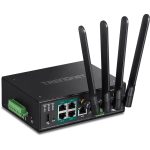In today’s tech-driven world, a reliable internet connection is no longer a luxury, it’s a necessity. But the unsung hero of your home network, the router, can often be an afterthought. While routers themselves aren’t complex devices, their lifespan can vary depending on several factors. How long will a router last? This comprehensive guide will explore how long a router typically lasts, the signs it’s time for an upgrade, and the latest router features to consider in 2024.
This comprehensive guide delves into the lifespan of Wi-Fi routers, exploring the key factors that impact their longevity and equipping you with the knowledge to determine when it’s time for an upgrade.
Understanding the Lifespan of a Router
The average lifespan of a router is generally estimated to be around five years. However, this is just a baseline, and the actual longevity can vary depending on several factors:

- Usage: Heavier internet users with numerous connected devices, especially bandwidth-hungry ones like smart TVs and gaming consoles, will put more strain on their routers, potentially shortening their lifespan.
- Quality: Higher-quality routers, often from reputable brands, tend to be built with better components and offer more robust performance, translating to a longer lifespan.
- Environment: Extreme temperatures, dust, and humidity can take a toll on a router’s internal components. Keeping your router in a well-ventilated, clean location will help it last longer.
- Security Updates: Manufacturers regularly release firmware updates to address security vulnerabilities and improve performance. Routers that don’t receive updates become susceptible to security risks and may become unreliable over time.
Signs Your Router Needs Replacing
While a five-year lifespan serves as a general guideline, there are specific signs that indicate your router might be nearing its end and needs replacing:
- Frequent Disconnections: If you’re constantly dropping connections or experiencing sluggish internet speeds, it could be a sign of a failing router.
- Limited Range: If your Wi-Fi signal doesn’t reach all corners of your home, or the strength is significantly weaker in certain areas, it might be time for a router upgrade with a wider range.
- Buffering and Lag: Constant buffering while streaming videos or experiencing lag during online gaming can be frustrating and point towards router limitations.
- Difficulty Connecting New Devices: If you have trouble connecting new devices to your Wi-Fi network, it could be a sign that your router can’t handle the increased load.
- Security Concerns: If your router is an older model that no longer receives security updates, it’s vulnerable to cyberattacks. Replacing it with a router that offers the latest security protocols is essential.
Benefits of Upgrading Your Router
Upgrading your router isn’t just about fixing problems with your current one. New routers offer a multitude of benefits that can significantly enhance your internet experience:

- Faster Speeds: Newer routers utilize the latest Wi-Fi standards like Wi-Fi 6 and Wi-Fi 6E, offering significantly faster data transfer speeds compared to older models.
- Improved Range and Coverage: With advancements in antenna technology, newer routers provide wider Wi-Fi coverage, eliminating dead zones in your home.
- Enhanced Security Features: Modern routers come equipped with advanced security features like WPA3 encryption and built-in firewalls, protecting your network from unauthorized access and malicious attacks.
- Better Device Handling: Newer routers are equipped to handle an increased number of connected devices efficiently, ensuring smooth performance even in smart homes with numerous gadgets.
- Improved Quality of Service (QoS): Many routers offer QoS features that prioritize bandwidth allocation for specific devices or applications, ensuring smooth performance for activities like online gaming or video conferencing.
Choosing the Right Router for Your Needs
With the plethora of routers available, choosing the right one can be overwhelming. Here are some key factors to consider:

- Internet Speed: Ensure the router you choose is compatible with your internet plan’s speed. If you have a high-speed internet plan, a router that supports the latest Wi-Fi standards like Wi-Fi 6 or Wi-Fi 6E is essential to take full advantage of those speeds.
- Coverage Area: Consider the size of your home and choose a router with sufficient coverage. Look for routers with multiple antennas for better signal strength and penetration.
- Number of Devices: If you have a large number of connected devices, especially smart home devices, choose a router that can handle the load efficiently. Routers with features like MU-MIMO (Multi-User, Multiple-Input, Multiple-Output) technology are better equipped to manage multiple devices simultaneously.
- Security Features: Look for a router with WPA3 encryption and built-in firewalls to safeguard your network from cyber threats.
Top Features to Look for in a New Router
Now that you understand the benefits of upgrading and factors to consider when choosing a new router, let’s delve into some key features to prioritize:
- Dual-band or Tri-band Technology: Most modern routers are either dual-band (2.4 GHz and 5 GHz) or tri-band (2.4 GHz and dual 5 GHz bands). The 2.4 GHz band offers wider range but slower speeds, while the 5 GHz band provides faster speeds but shorter range. Dual-band routers are ideal for most homes, while tri-band routers offer even better performance and are suitable for large homes or users with numerous devices.
- Beamforming Technology: Beamforming technology focuses the Wi-Fi signal towards your connected devices, improving signal strength and reducing interference. This is particularly beneficial for users with multiple devices spread across the home.
- Mesh Wi-Fi Systems: For expansive homes or those with complex layouts, mesh Wi-Fi systems offer a blanket of Wi-Fi coverage. These systems consist of multiple units that work together to eliminate dead zones and provide seamless Wi-Fi throughout your entire home.
- Parental Controls: If you have children at home, parental controls allow you to manage their internet usage. These features can restrict access to inappropriate websites, set time limits, and prioritize bandwidth for specific devices.
- Guest Network: A guest network allows you to provide internet access to guests without compromising your primary network security. This is a great way to keep your personal data secure while offering internet access to visitors.
Extending the Life of Your Router
Even with proper maintenance, routers eventually reach the end of their lifespan. However, there are steps you can take to maximize their longevity:

- Placement: Position your router in a central location within your home, away from walls and electronic devices that can interfere with the signal. Keep it elevated for optimal signal distribution.
- Ventilation: Ensure proper ventilation around your router to prevent overheating, which can shorten its lifespan. Avoid placing it in enclosed spaces or on top of heat-generating electronics.
- Regular Cleaning: Dust buildup can impact performance. Use a can of compressed air to gently remove dust from the router’s vents at regular intervals.
- Firmware Updates: Whenever available, install firmware updates from your router manufacturer. These updates often include security patches, performance improvements, and bug fixes.
- Reboot Occasionally: Just like any electronic device, rebooting your router occasionally can help clear temporary glitches and improve performance.
Beyond Technical Specifications: Additional Factors to Consider
While technical specifications are important, there are additional factors to ponder:
-
Smart Home Integration: If you have a smart home ecosystem, ensure your chosen router is compatible with smart home devices and supports relevant protocols.
-
Mesh Networking: For large homes with Wi-Fi dead zones, consider a mesh networking system, which uses multiple units to create a seamless blanket of Wi-Fi coverage throughout your entire home.
-
Budget: Routers range in price from budget-friendly options to high-performance models. Determine your budget and choose a router that offers the best combination of features and performance within your price range.
Making an Informed Decision: Upgrade or Repair?
While upgrading to a new router offers numerous advantages, repairing your existing one might be a viable option in certain situations. Here’s how to decide:

- Age of the Router: If your router is older than five years and exhibits performance issues, upgrading is the recommended course of action. Newer routers offer significant advancements in speed, security, and features.
- Nature of the Problem: If the problem is minor, like a loose cable, a simple repair might be all that’s needed. However, for hardware failures or outdated technology, upgrading is a better long-term solution.
- Budget: Upgrading to a new router can be an investment. If you’re on a tight budget, consider a basic repair if it can resolve the issue. However, if you need a significant performance boost or enhanced security features, upgrading is a worthwhile investment.
Invest in a Reliable Connection: Upgrade Your Router Today!
Now that you’re armed with the knowledge of router lifespans, signs to upgrade, and valuable features to consider, it’s time to make an informed decision. Don’t settle for sluggish internet speeds, dropped connections, or security vulnerabilities. Upgrading your router can significantly enhance your online experience, ensure seamless connectivity for all your devices, and provide the peace of mind that comes with robust network security.


